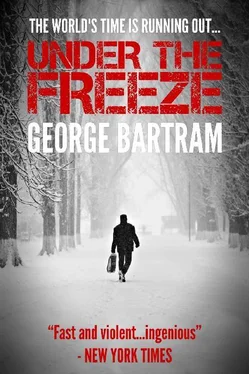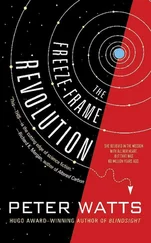“Same man?” Strisz said conversationally. He might have been listening politely to a story about a not very interesting acquaintance.
“Perhaps. Logic would say so.” Tarp leaned back. “But I don’t think you’re the man who tried to kill me in London.” Strisz smiled a little painfully. “Did I try to kill you in Cuba?”
“That could certainly be.”
“And who stole the plutonium.”
“Yes, and who blew up Repin and that aircraft. Did you ever see those dancers?”
“They weren’t from Moscow.”
“They were very young. Good-looking, vital.”
“Are you trying to shame me?”
“Maxudov is beyond shame.”
“Well, surprisingly, you do shame me. Amazing, yes? I’m amazed myself. I don’t like death. I don’t like violence. I’ve never been involved in wet work. I am an intelligence officer . I am fascinated by the collection and analysis of facts. The other side of the business…” He seemed sincere. “It is evil. Do you believe me?”
“You seem very believable. But Maxudov will always seem believable.” Tarp stood up. “I may want to talk to you again.”
“But do you believe me?”
Tarp looked at him. He knew that nobody who had risen this high could be simple or simply fun-loving or really open. He thought of Juana’s bandaged head and the huge gash on her shoulder. He thought of the dancers in Havana. He thought of the old man lying in his blood in the Paris restaurant. He thought of Johnnie Carrington without his arm. “No, I don’t believe you,” he said. “If you really thought you hated violence, and you stayed in this business, you would be so self-deluded you would be a lunatic. You aren’t a self-deluded man.” He gathered up his papers and his coat and the Astrakhan hat he had been provided. “Neither is Maxudov.”
* * *
Konstantin Mensenyi met him in a park. Their cars were thirty yards apart on the wet, narrow road, the drivers inside with their newspapers while the two men walked across a field on which melting snow lay in a pierced crust that stood on the tips of the grass like lace. The firs that stood around the field were black in the gloom of the dense cloud.
Mensenyi was grossly fat — double-chinned, blubber-lipped. Tarp disliked him on sight, then scolded himself for deserting any attempt at objectivity.
“I protest,” Mensenyi began. “I am making my protest formally, to the general secretary. It is bad enough to be suspected of the worst crime of the century, but it is unspeakable that they should bring me face-to-face with a man like you.”
“Your department is Latin America?” Tarp said coldly.
“Did you hear what I said just now?” Mensenyi had a rather high voice. The fat and the high pitch made him seem a eunuch, but his file mentioned a wife and five children and a problem with a girl who had been a maid in the house.
“Your protest is noted and I think you are wise to make it formally to the secretary-general. Is your department Latin America?”
“You know it is.”
“Including Cuba?”
“You know the answer to that, too.”
“I’d prefer to hear it from you.”
“Bah. Very well. Cuba is not in my department except in cases where there is overlap.”
“Argentina?”
“Argentina, yes.”
“You managed the transfer of intelligence materials to the Argentinians during the Falklands war?”
“That is not relevant.”
“It is relevant if I make it relevant. Answer the question.”
“I protest. I will put this in my written protest as a breach of security. The answer is yes — note what sort of grief you may have caused yourself by acquiring classified data!”
“Did you receive a reprimand from the director for your conduct of intelligence during the Falklands war?”
Mensenyi grunted, then stopped. He looked around them, as if to make sure they were in the very center of the lace-covered field. “A letter was put in my file,” he said softly.
“You used a courier sometimes whom you called Penguin.”
“Code name Penguin, yes, yes. What has this to do with anything?”
“Penguin made four trips to the Soviet Union in the last three years.”
Mensenyi stared at him. He breathed partly through his mouth; his nose was thickened above the nostrils as if from adenoids. “Well, what if he did?”
“Three of them came immediately after three of the plutonium thefts.”
“I—” Mensenyi breathed heavily and then puffed out his cheeks. “The dates of the thefts are not known. Surely. Are they?”
“Putting two and two together, Comrade — the sailing dates of certain submarines — yes, that is known well enough. What have you to say about this coincidence?”
“It is a coincidence, what else? Ask Penguin, if you think you have made such a brilliant analysis! Eh? Go ahead!”
“Give me the identity of Penguin, and I will.”
Mensenyi contrived to look very sly. “Oh, no. That is very highly classified. No, no, you don’t trick me that way.” He stabbed a short, gloved finger into Tarp’s chest. “If you want to know that, you go to the general secretary.”
Andropov had called Mensenyi a clown. He struck Tarp as more of an ox, a stubborn, almost immovable dullard. In fact, he reminded Tarp of Hacker, the CIA turncoat.
“You have made five trips to the West since 1971,” Tarp said. “England twice, France twice. Canada once…”
“What of it?”
“What was the purpose?”
“I was meeting with very important people from the other side.”
“Yes, that’s what the file says. What were the real reasons?”
“The file reasons are the real reasons!”
“There are very few good reasons for a department head’s leaving Moscow.”
“I was not department head until 1977.”
“Your last trip was to London in 1981.”
Mensenyi set his fleshy jaw. His cheeks, mottled with red from the raw, wet breeze, looked like slabs of meat. “I brought out an English agent who was going to be exposed.”
“England is not in your area.”
“I was ordered to bring him out.”
“You were ordered to bring him out because you begged to do so. It’s all in the file.”
Mensenyi’s face became ugly. “He was an old friend.”
“You make a hobby, do you, of running agents in areas not your own?”
“I do whatever I can to help the nation, the Party, and world communism. I have always cultivated foreigners. I understand the foreign mentality. I have performed valuable service, turning foreigners to good use.”
“You’ve also imported a remarkable collection of foreign art objects and consumer goods. You’ve even once been the object of an investigation into a black market food shop run for the diplomatic community in Moscow.”
“I explained all that satisfactorily,” Mensenyi said hoarsely. “It was to entrap foreigners.”
“And turn a profit.”
“I turned all profit over to the state!”
“After the investigation began.”
“Bad timing! I was guilty of bad timing!”
Andropov had been right. The man was a clown.
Tarp ran quickly through the dates of the foreign visits, his contacts in the nuclear industry, his proximity on two occasions to the home port of the submarines at Murmansk. Mensenyi was sweating despite the wind. “You have nothing!” he shouted. He was in rage, or pretending to be. “I am innocent! I am not Maxudov! I am a thousand times better man than you!”
“Have you read Bulgakov’s Theatrical Novel ?”
“ What ?”
“I may want to talk to you again in a few days.”
“Wait — See here…” Mensenyi put a gloved paw on his arm. “You’re finished?”
Читать дальше












